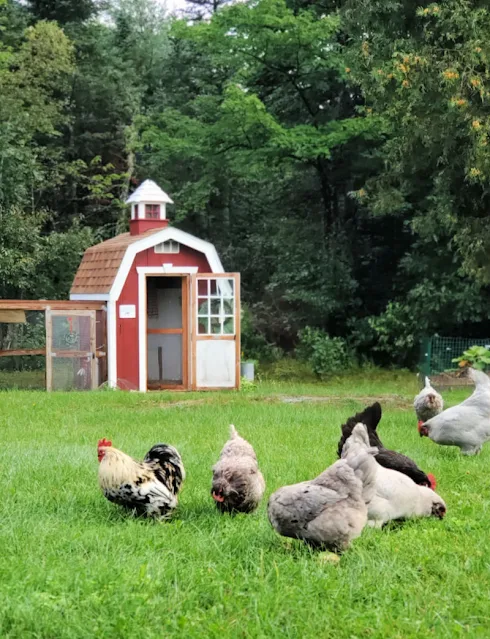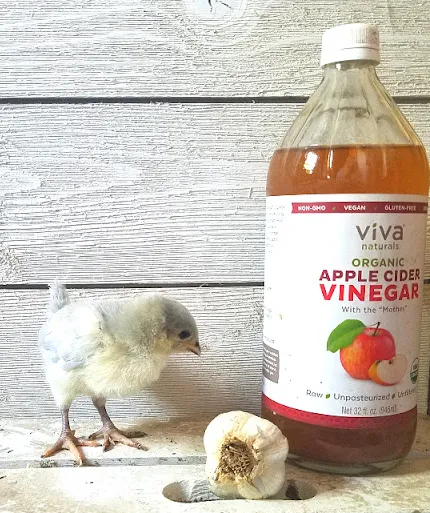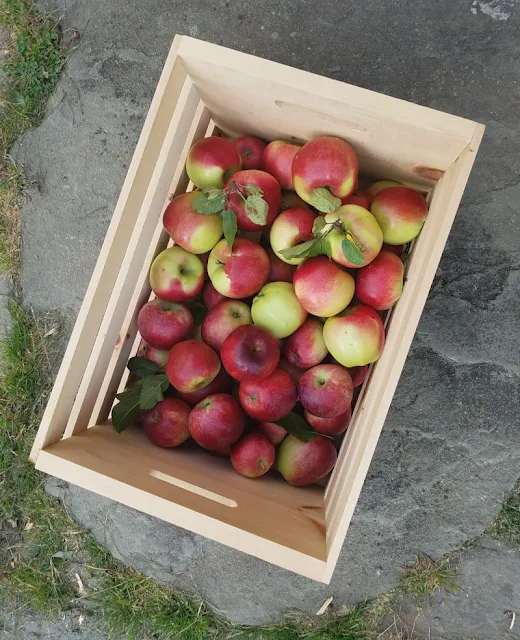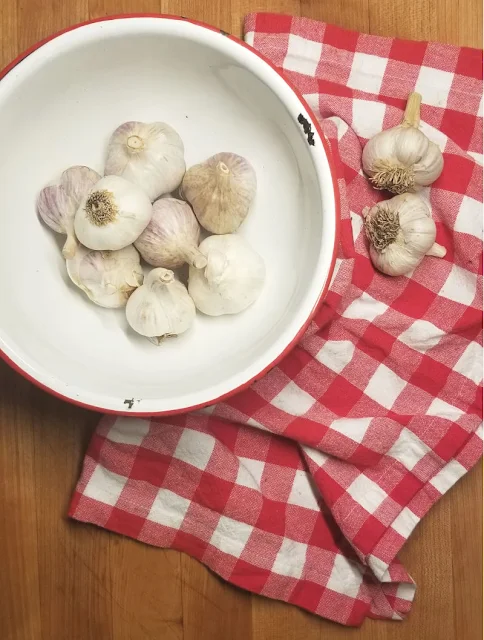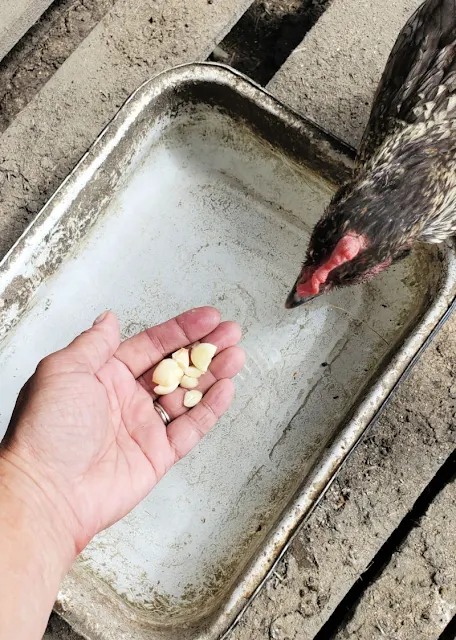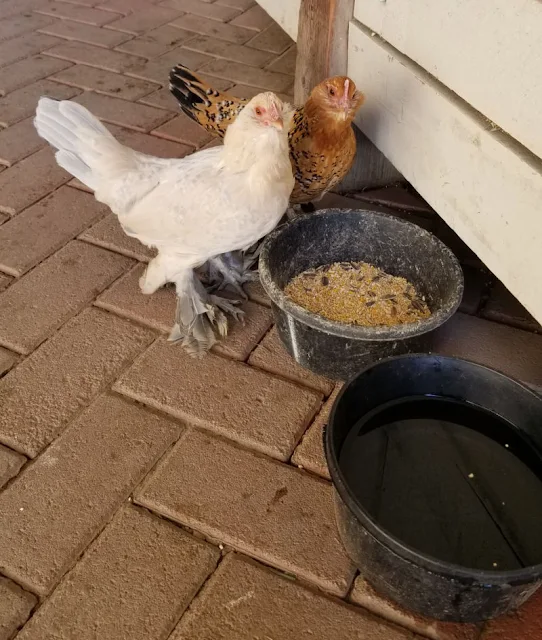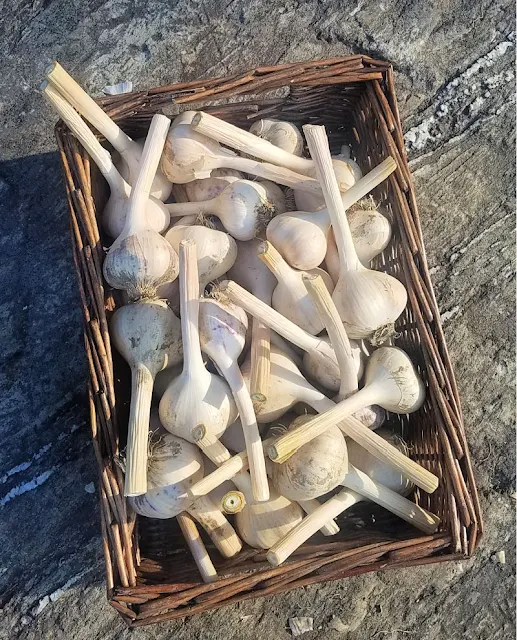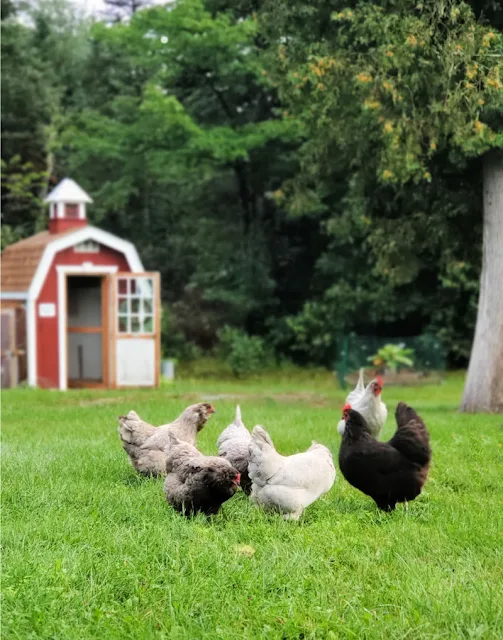Apple Cider Vinegar, Honey, and Garlic "Magic Water" for Chickens
I firmly believe in an ounce of prevention. In fact, wasn't it Benjamin Franklin who said "An ounce of prevention is worth a pound of cure"?
He was a smart man - and I bet he wasn't even talking about chickens! But he was right...
Natural Preventives for Chickens
It's far easier (and cheaper) to keep your chickens' immune systems strong and healthy to give them the best chance at fighting off illness and infections themselves than to try and treat something after they have contracted it.
Of course there are naysayers.
Of course some of this natural care for chickens is hard to prove, it's near impossible to find any published studies, and of course I am not a vet or a scientist, but I CAN tell you this: In all my years of raising chickens, I have NEVER had any health issues with my chickens. Ever. (And we're going on 15+ years now.)
My Flock Health Track Record
I have never wormed my chickens with anything commercial or chemical and they have never had issues with any internal parasites.
I have never had a single chicken with respiratory problems, coccidiosis or any other disease.
My chickens are never sick. And in fact, my oldest have lived to be nine-plus years old and we have ducks who have lived to be 12 years old....they have all died of old age basically.
So you be the judge.
Apple Cider Vinegar, Honey, and Garlic "Magic Water" for Chickens
If you do nothing else except feed your flock, collect eggs and lock them up at night in their coop, adding apple cider vinegar, honey and garlic to their water is the single most important thing you can do for their health.
Boosting Chicken Flock Immune Systems
Being the ultimate prey animal and being part of a pecking order that preys on the weaker members of the flock, chickens work very hard to hide signs of any illness or injury, so often by the time you see any symptoms, it is too late to treat whatever is wrong.
Because of this, I work really hard to support my flock's immune system as much as I can.
So for that reason, I supplement my flock's diet with "magic water" which is a combination of apple cider vinegar, honey and garlic, and I do that starting with my day old chicks and continuing for life during times of stress.
Apple Cider Vinegar, Honey, and Garlic "Magic Water" for Baby Chicks
The health benefits of the apple cider vinegar, honey, and garlic begin in my flock right from day one.
Small chicks should be offered crushed fresh garlic early on so they develop a taste for it. A splash of apple cider vinegar in their water is also a great health booster for chicks. And the honey helps give them an energy boost after a stressful hatch and/or trip through the mail.
When they're chicks I will add just a few drops of apple cider vinegar to their water, a drizzle of honey, and the ends of a garlic clove - to get them used to the taste at first, more than anything.
Magic Water for Baby Chicks
If you want an actual recipe, to make a quart of Magic Water I would use:
- 1 quart of water
- garlic clove, smashed or minced
- 1 teaspoon of real apple cider vinegar with the "mother"
- 3 teaspoons of raw honey
- 1 gallon of water
- 4 garlic cloves
- 4 teaspoons apple cider
- 1/4 cup raw honey
Apple Cider Vinegar for Chickens
Apple cider vinegar is great for chickens (and humans). But it's got to be the "good stuff". You want to find raw, organic vinegar with the mother. There are cheaper alternatives on the store shelves, but they don't contain the healthy "mother" which is what you want.
Good-quality apple cider vinegar can get expensive, but it's still going to be cheaper than a vet visit, so it's well worth the relatively small investment.
Or you can also easily (and very inexpensively) make your own Apple Cider Vinegar with the mother using leftover apple peels.
Benefits of Apple Cider Vinegar for Chickens
Some of the health benefits of apple cider vinegar for chickens include:
- Strengthening immune systems
- Guarding against bad bacteria
- Maintaining digestive health in the intestines
- Balancing acid in the stomach
- Acting as an overall health booster
- Keeping the water free of harmful algae and bacteria
More Benefits of Apple Cider Vinegar for Chickens
Apple cider vinegar also:
- Increases the absorption of calcium (as well as other minerals) so your chickens will get more 'bang for the buck' from the layer feed and eggshells or oyster shell you provide them to make strong shells on their eggs
- Acts as an antiseptic by killing the germs that cause respiratory problems - which chickens are extremely susceptible to - in the throat and promotes healthy mucous flow.
How Often to Give Apple Cider Vinegar to Chickens
Apple cider vinegar can be given year round to your chickens. There are two ways to add it to your chickens water. You can choose the routine that works best for you.
- Add apple cider vinegar to your chickens waterer a once or twice a week
- Add apple cider vinegar to your chickens water for one straight week every month
**Be sure to use a plastic, enamelware or stoneware waterer. The vinegar will eventually rust metal and galvanized waterers.
How Much Apple Cider Vinegar to Give to Chickens
At first when you offer your chickens water with apple cider vinegar added to it, you might also want to offer plain water, just in case any of your chickens don't take to it right away.
In my personal experience and from everything I've read, chickens actually like the taste of the vinegar and it's thought to encourage them to drink more.
But to be on the safe side, if you're just starting to offer the apple cider vinegar to your chickens, putting out plain water as well for a couple of days is a good idea.
The ratio is 1 Tablespoon ACV per gallon of water.
The optimal range for your flock's drinking water is a pH of 4. That creates the most unfriendly environment for bad bacteria.
Apple cider vinegar will help with that.
Honey for Chickens
Honey provides quick energy to baby chicks and chickens, and also has loads of other health benefits. Be sure you are using raw honey, not the processed kind. Makuna honey is the most nutritious, but can be hard to find and is more expensive.
Health Benefits of Honey for Chickens
Benefits of adding honey to your flock's water include:
- Fights heat stress
- Improves calcium absorption
- Makes stronger bones and legs
- Helps to heal wounds and burns
- Antibacterial
- Anti-oxidant
- Anti-inflammatory
- Source of Vitamin C
- Source of Vitamin E
- Source of magnesium, phosphorus, and potassium
- Improves heart health
- Improves brain function
How to Feed Honey to Chickens
Add 4 to 5 tablespoons of honey to a quart of water and offer the honey water during times of stress including heat stress, shipping, or an injury or wound.
Garlic for Chickens
Garlic is also wonderful for both chickens and humans. And before you ask, no, feeding your chickens garlic won't make their eggs taste like garlic. I promise. And even if it did, garlic has so many great health benefits for your flock.
More and more studies are being done testing garlic in poultry flocks, like this one that used garlic and clove oil to reduce the incidence of enteritis in chickens. Enteritis is an often fatal disease caused by bacteria or viruses in the intestines. It causes inflammation of the gastrointestinal tract as well as dead tissue.
Coccidiosis (which is the #1 killer of chicks under a month old) is often a precursor to enteritis, so offering garlic to backyard chicken flocks prudent.
Health Benefits of Garlic for Chickens
Some of the health benefits of garlic for chickens include:
- Boosts the immune system
- Supports respiratory health
- Improves heart function
- Helps to deter mites, lice, ticks and other parasites not attracted to the blood of animals who eat a lot of garlic
More Benefits of Garlic for Chicken
- Reduces the smell of chicken manure
How to Feed Garlic to Chickens
Garlic can be added to your chickens' diet in a couple of different ways:
- You can float whole cloves in your waterer (mashed up a bit), replacing them every few days.
- You can offer crushed fresh cloves in a small dish free-choice.
- You can add add garlic powder to their feed.
The most economical and efficient way to feed your chickens garlic is to mash a few cloves into their water a few times a month.
You always want to crush the cloves and let them be exposed to the air before adding them to your chickens' water. This activates the sulfur compounds (called the allicin) in the garlic which is responsible for many of the health benefits of the garlic.
Whenever I am cooking with garlic, I save the ends that I cut off and toss them into my chickens' water.
A Bit More about Garlic for Chickens | Is Garlic Toxic to Chickens?
You may have read or been told that garlic is toxic for animals, specifically chickens and dogs. I can tell you unequivocally that offering garlic to your chickens is not only not harmful, it is extremely beneficial.
The first problem with the perception that garlic may be toxic is that garlic is in the onion family and we have all been warned that onions are toxic to animals, and by that logic garlic must be as toxic also.
People have incorrectly linked garlic and onions as being the same level of toxic and until recently (in the early 2000's), no one made an effort to take another look at garlic or it's true levels of toxicity.
Although garlic is in the allum family which also contains the potentially toxic onion, the levels of the toxins thiosulphate and disulfide in garlic is only 1/15th that of what's found in onions. So I feel very comfortable adding garlic to our chickens' daily feed.
The second problem with the perception that garlic can be toxic is that when studies were conducted to see just how toxic it may be (these studies were done in the 1930's), the amount of garlic given to the animals (dogs and cats in this case) was excessive.
In some studies 6 times (or six whole cloves) the amount of garlic was fed - that's equal to a whole bulb of raw garlic.
Far, far more than your chickens would ever be eating.
Recent Garlic Studies
Although a small dose of onions can be toxic to animals, causing anemia, and even though garlic is in the onion family it simply does not have the same levels of toxins. In fact garlic has only 1/15 the level that onions have, and this is in it's raw, whole form.
When garlic is further processed for consumption as a powder supplement, mixed with other supplements and minerals (as in the case of my Brewer's Yeast with Garlic feed supplement), and given at appropriate doses, then the thiosulphates are negligible, at best.
The fact is that garlic is not toxic when taken at low levels and is often included as an ingredient in many commercially available natural pet foods.
As with anything in life, the levels or doses you take of something is the deciding factor on how toxic it will be.
Our ducks will sometimes fish out the whole clove of garlic from the water and eat it - and yet our oldest ducks are 12+ years old... so clearly that hasn't been too detrimental to their health!
I firmly believe that offering my chickens apple cider vinegar, honey, and garlic in their water from hatch right through their life is to be credited with their longevity and continued good health.



